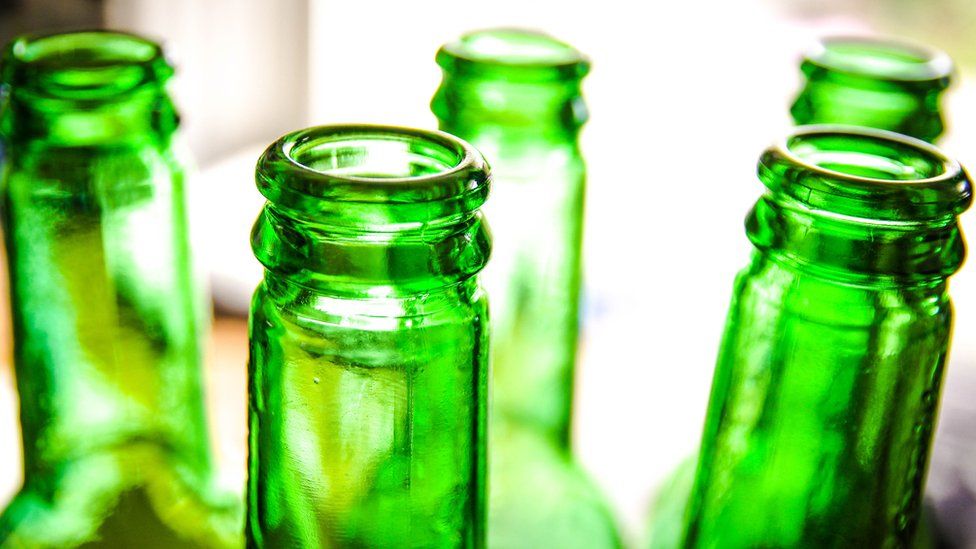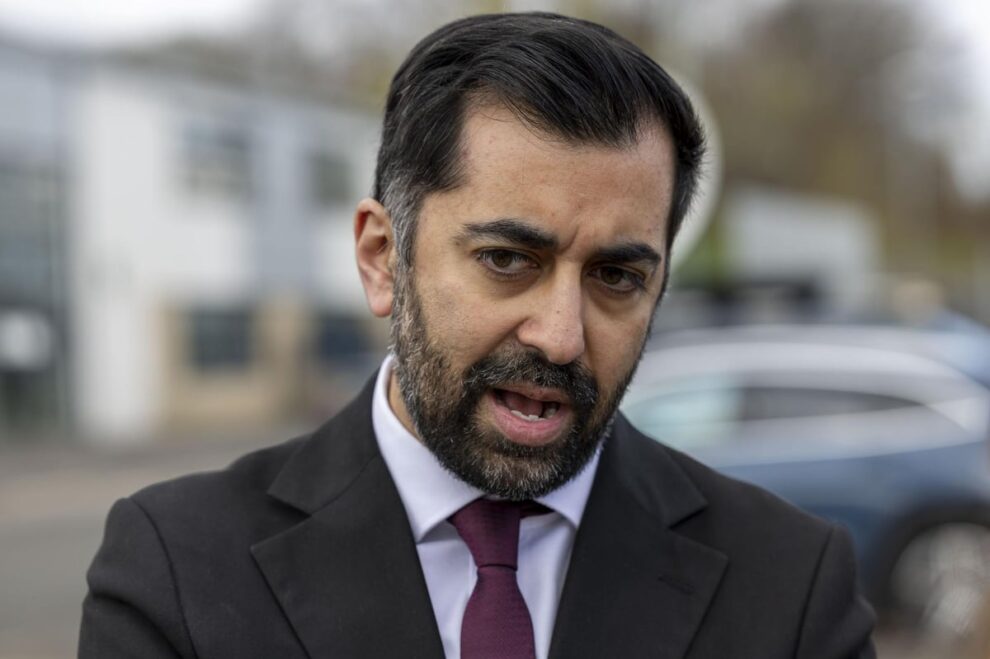The first minister has told the BBC he is struggling to see how Scotland’s deposit return scheme can go ahead without the UK government’s support.
Humza Yousaf has written to Prime Minister Rishi Sunak asking him to agree to include glass bottles in the scheme.
He has set Monday as a deadline for a response and agreed that this was “effectively” an ultimatum.
The UK government said deposit return schemes should be consistent UK-wide.
In his letter to the prime minister, Mr Yousaf accused the UK government of placing the deposit return scheme (DRS) in “grave danger”.
He said the demands would have a “significant impact” on business.
The administrator of Scotland’s DRS, Circularity Scotland, has now urged the UK and Scottish governments to “get round the table” to deliver the programme.
The UK government wrote to the Scottish government last week granting a partial exemption to the Internal Market Act which would exclude glass containers from the DRS – which is due to go live in Scotland in March next year.
Mr Yousaf has urged a rethink from the UK government, citing concerns from one of Scotland’s biggest brewers.
“The removal of glass fundamentally threatens the viability of Scotland’s DRS with reduced revenue for the scheme administrator,” he wrote.
“Removing glass will also have a significant impact on business.
“For example, C&C Group – owners of the iconic Tennent’s brand – has been explicit that the decision by the UK government to remove glass threatens investment and jobs.
“Other Scottish businesses have raised similar concerns privately with us.”

Mr Yousaf later told BBC Scotland Tennent’s had said that, apart from threatening jobs and investment, excluding glass would also put the company at a competitive disadvantage.
“I’m not prepared to do that,” he said. “The Scottish government will not be prepared to do that and now that we’ve heard from these companies I’m saying to the prime minister it’s very simple – you agree to include glass in the scheme or I’m afraid I struggle to see how the scheme can go ahead because I will not put Scottish businesses at that disadvantage.”
Mr Yousaf said he hoped the UK government would listen and agree to provide the Scottish government with the necessary exemption from the Internal Market Act.
The UK government’s move sparked another constitutional row between Edinburgh and London, with the first minister writing in his letter to Mr Sunak: “There are much wider consequences of the decision.
“This UK government intervention at such a late stage demonstrates a major erosion of the devolution settlement.
“I urge you to revoke the conditions set out in your letter and grant a full exclusion for Scotland’s DRS, to be implemented as per the regulations agreed by the Scottish Parliament in this area of devolved competence.
“Without this, the Scottish government is not prepared to put Scottish businesses at a competitive disadvantage due to the last-minute demands the UK government has made.
“There is little doubt your government’s action have put the future of DRS in grave danger, not only in Scotland but also in the rest of the UK due to the damage to consumer and investor confidence.”
It is looking increasingly likely that the deposit return scheme will be scrapped.
The Scottish government wants the scheme to cover glass bottles, plastic bottles and drinks cans.
But the UK government has an effective veto – it needs to provide the Scottish government with an appropriate exemption from the Internal Market Act which is designed to ensure there are no barriers to trade within Britain.
The UK government is only prepared to offer an exemption covering plastic bottles and drinks cans.
Humza Yousaf hopes the UK government will listen to Holyrood and provide that wider exemption.
But there seems to be no chance of that happening by Monday.
If the scheme is dropped, supporters of the Scottish government will argue it is the result of an attack on devolution itself and the rights of the Scottish parliament,
But critics will say the problem could have been foreseen.
Another of the conditions placed on the scheme was the insurance of “interoperability” between the Scottish scheme and the anticipated English DRS, which is intended to launch in October 2025.
The first minister conceded the ability for the schemes to work together where possible would be “desirable”, but added that the UK government was “unable to provide the operational details required to allow the schemes to be interoperable” due to it being at such an early stage.
“Businesses need certainty and they need it now – not in two years time when the UK government scheme potentially, hopefully launches,” he added.
“The UK government has significantly undermined the clarity and certainty that businesses unanimously tell us they need.”
Mr Yousaf also pointed out that the UK government had intended to include glass in the English DRS from 2019 right up until March 2022 – two years after regulations were passed by the Scottish Parliament.
“We planned our scheme on this basis,” he said.
The first minister added that as late as January 2023, the UK government confirmed that it was for devolved governments to decide the scope of their DRS.
“The Welsh government’s stated intention has been to include glass in their DRS, meaning that it is the English scheme which is out of step with the design of other UK schemes,” Mr Yousaf said.
The first minister asked for a response from Downing Street by Monday to allow for the issue to be discussed by the Scottish Cabinet the following day and to update Holyrood.

The Scotland Office said it would respond to the first minister’s letter in due course, with a spokeswoman adding: “The government remains unwavering in its commitment to improving the environment while also upholding the UK’s internal market.
“The drinks industry has raised concerns about the Scottish government’s DRS differing from plans in the rest of the UK, resulting in the Scottish government reviewing and pausing their scheme earlier this year.
“We have listened to these concerns and that is why we have accepted the Scottish government’s request for a UK internal market (UKIM) exclusion on a temporary and limited basis to ensure the Scottish government’s scheme aligns with planned schemes for the rest of the UK.”
The spokeswoman added: “Deposit return schemes need to be consistent across the UK and this is the best way to provide a simple and effective system.
“A system with the same rules for the whole UK will increase recycling collection rates and reduce litter – as well as minimise disruption to the drinks industry and ensure simplicity for consumers.”
‘Jeopardising credibility’
A spokesman for Scotland’s DRS administrator said: “Circularity Scotland, our members and business and industry partners have invested around £300m to develop a deposit return scheme and have done so at no cost to the taxpayer.
“This scheme will be ready to launch in March 2024 and will be a platform for a scaled-up and interoperable pan-UK scheme.
“We urge both governments to urgently get round the table and agree a pathway for integrated and harmonised deposit return schemes across the UK.
“Without this agreement, investment and public confidence will be seriously damaged, jeopardising credibility for investment in any future major environmental projects.”
Scottish Conservative MSP Maurice Golden said: “Issuing this ultimatum is a cynical and transparent attempt to create a constitutional spat to divert attention from another unravelling SNP-Green policy.
“The reality is that DRS has been an utter shambles from the start – and nationalist ministers only applied for an internal market act exemption at the very last minute.
“Retailers have no confidence that the SNP-Greens can deliver the efficient recycling system that we all want to see.”
Source : BBC





